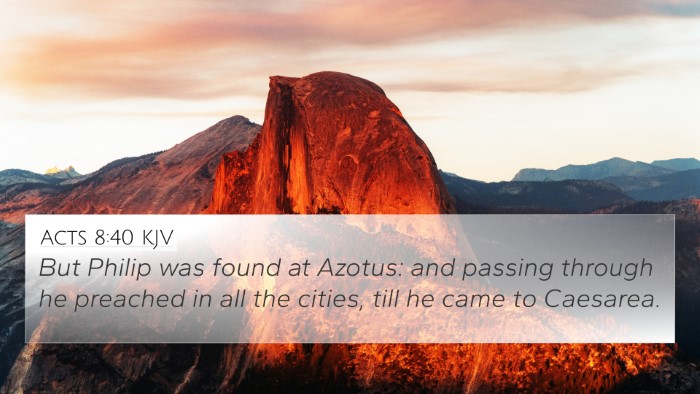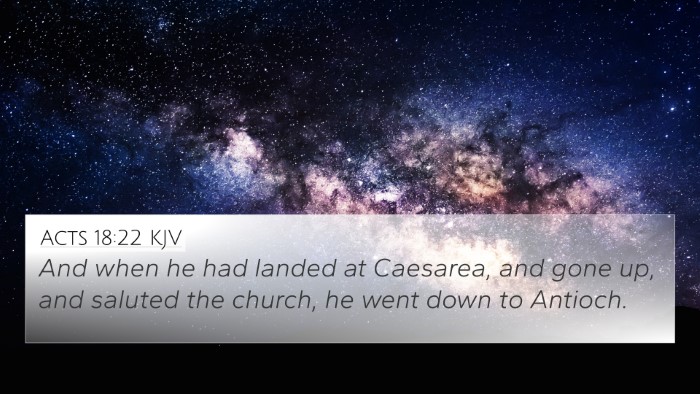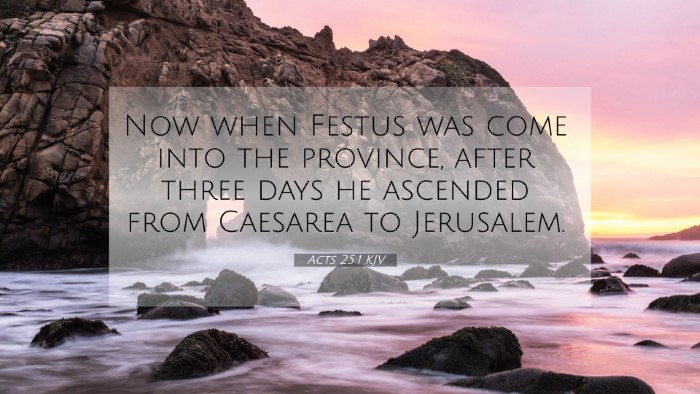Old Testament
Genesis Exodus Leviticus Numbers Deuteronomy Joshua Judges Ruth 1 Samuel 2 Samuel 1 Kings 2 Kings 1 Chronicles 2 Chronicles Ezra Nehemiah Esther Job Psalms Proverbs Ecclesiastes Song of Solomon Isaiah Jeremiah Lamentations Ezekiel Daniel Hosea Joel Amos Obadiah Jonah Micah Nahum Habakkuk Zephaniah Haggai Zechariah MalachiActs 25:1 Similar Verses
Acts 25:1 Cross References
Now when Festus was come into the province, after three days he ascended from Caesarea to Jerusalem.
Uncover the Rich Themes and Topics of This Bible Verse
Listed below are the Bible themes associated with Acts 25:1. We invite you to explore each theme to gain deeper insights into the Scriptures.
Acts 25:1 Cross Reference Verses
This section features a detailed cross-reference designed to enrich your understanding of the Scriptures. Below, you will find carefully selected verses that echo the themes and teachings related to Acts 25:1 KJV. Click on any image to explore detailed analyses of related Bible verses and uncover deeper theological insights.

Acts 23:34 (KJV) »
And when the governor had read the letter, he asked of what province he was. And when he understood that he was of Cilicia;

Acts 8:40 (KJV) »
But Philip was found at Azotus: and passing through he preached in all the cities, till he came to Caesarea.

Acts 18:22 (KJV) »
And when he had landed at Caesarea, and gone up, and saluted the church, he went down to Antioch.

Acts 25:5 (KJV) »
Let them therefore, said he, which among you are able, go down with me, and accuse this man, if there be any wickedness in him.
Acts 25:1 Verse Analysis and Similar Verses
Understanding Acts 25:1
Acts 25:1 states: “Now when Festus had come to the province, after three days he went up from Caesarea to Jerusalem.”
Summary of Acts 25:1
This verse marks a transition in the narrative of the Apostle Paul, highlighting a significant event in the timeline of his imprisonment. Festus, who succeeded Felix as governor, is introduced, and his actions set the stage for the unfolding drama surrounding Paul's trials and defenses.
Insights from Public Domain Commentaries
Matthew Henry's Commentary:
- Henry notes that Festus’s arrival in the province signifies a new administrative phase, crucial for understanding the political backdrop of Paul's situation.
- He emphasizes that the quick trip to Jerusalem indicates the new governor's desire to engage with the Jewish leaders, as they had pressing concerns regarding Paul.
Albert Barnes' Notes:
- Barnes elaborates on Festus’s role, explaining that his proactive visit to Jerusalem was likely an attempt to gain favor with the Jewish community.
- He points out that the relationship between Roman authorities and Jewish leaders was delicate, highlighting the political maneuvering involved in Festus's actions.
Adam Clarke's Commentary:
- Clarke brings to attention the timeframe of Festus's arrival and notes the significance of Caesarea as a Roman seat of power at the time.
- His perspective focuses on the strategic implications of Festus's journey to Jerusalem, suggesting that it implies a need to address the unrest surrounding Paul.
Bible Verse Cross-References
This verse is interconnected with several other scripts within the Bible, providing a broader context. Here are some pertinent cross-references:
- Acts 24:27: This verse speaks of Felix, Festus's predecessor, and the political tensions present during Paul's imprisonment.
- Acts 25:6: Festus gathers the chief priests and Jewish leaders to discuss Paul's case.
- Acts 12:19: Highlights relationships and tensions between Roman authorities and Jewish leaders, setting a historical precedent.
- Acts 23:24: Relates to the military escort that delivered Paul safely to Felix, showing continued concerns for his safety.
- Luke 3:1: Provides context into the governance at the time of Jesus and early Christianity, framing the political landscape in which Paul operates.
- Acts 22:30: Discusses the Roman official's interest in understanding Paul's background before a trial.
- Matthew 27:2: References the legal proceedings against Jesus, showing parallels to Paul's own trial before Roman officials.
Thematic Connections and Interpretations
The events surrounding Acts 25:1 present themes of justice, political maneuvering, and the clash of different cultural identities. Festus’s actions exemplify the attempts to navigate through complex political landscapes while seeking to maintain order and satisfaction among different groups.
When studying this verse, we can draw connections between:
- The political tactics of Roman officials depicted throughout Acts
- The role of Jewish leaders in shaping early Christian narratives
- The consequences of power dynamics and how they affect individual lives, as seen through Paul’s plight
Cross-Referencing Bible Study
To gain deeper insights from Acts 25:1, we utilize various cross-referencing methods:
- Bible Concordance: Utilize a concordance to find similar terms and themes, linking together scripture that reflects on authority and judgment.
- Bible Cross-Reference Guide: Look up references that show how the narratives of Paul's trials relate to Old Testament figures facing unjust treatment.
- Cross-Referencing Bible Study Methods: Implement thematic approaches to identify how different authors treat the theme of justice.
- Identifying Connections between Old and New Testament: Study how the acts of governing and judicial proceedings depicted in the Old Testament inform our understanding of New Testament governance.
User Intent and Questions
As individuals seek to understand Acts 25:1, they might ponder:
- What verses are related to Acts 25:1?
- How do Acts 25:1 connect with the events surrounding Paul’s earlier trials?
- Similarities between Acts 25 and trials in earlier chapters.
- Bible verses that support Paul’s defense narrative.



